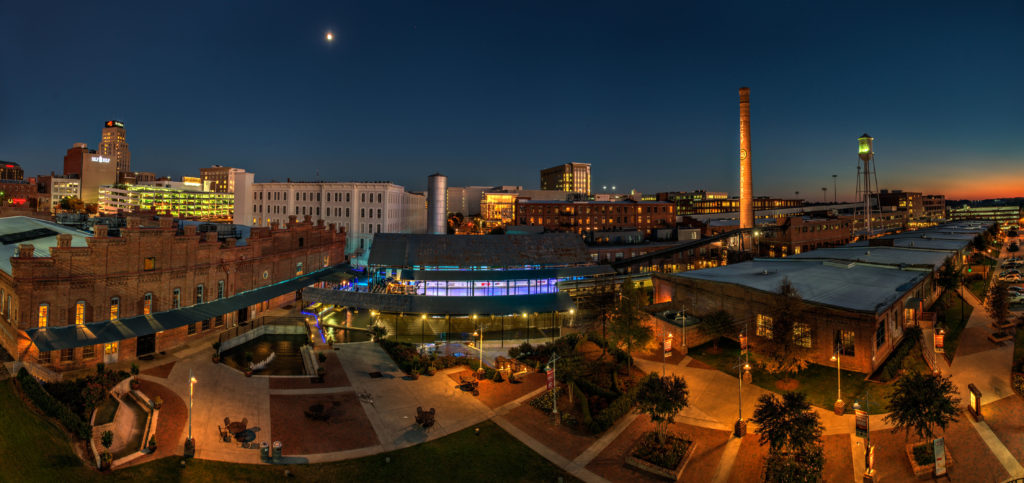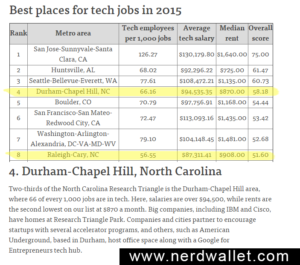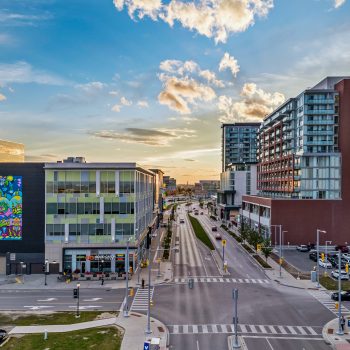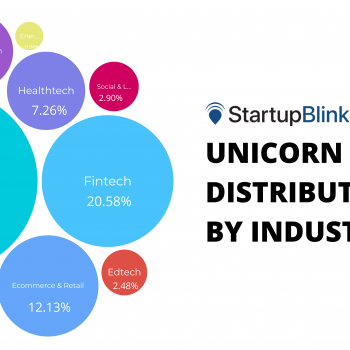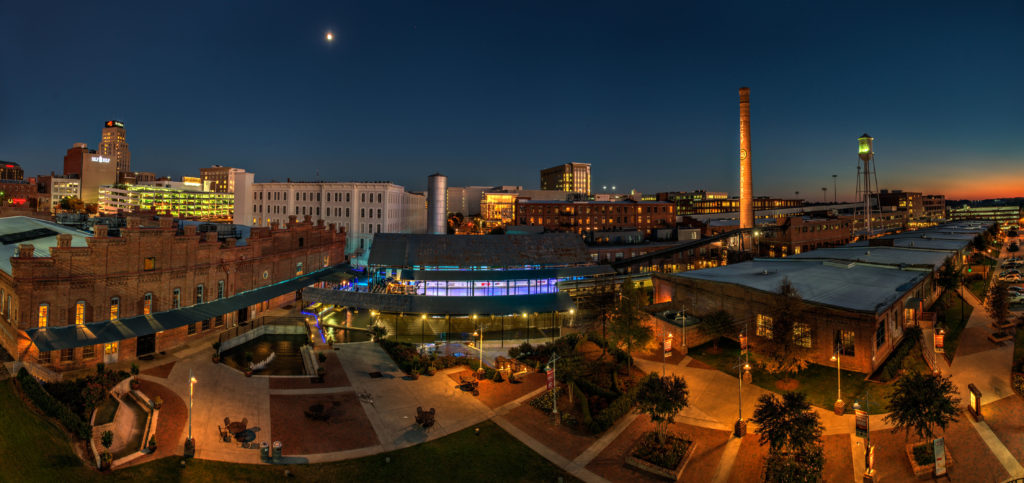
Click here to View Durham’s Startup Map
A month ago, I sat in Durham’s Carolina Theatre for the Rise of the Rest Tour with Steve Case, former AOL co-founder. The historic theater dates back to 1926 and has witnessed the city’s history: tobacco boom, desegregation and the recent economic recession. Leading the “fireside chat”, Case spoke of underdog stories and cities coming back from the brink. With tech startups sprouting with increasing gusto, Durham has been home to their successes and privy to their growing pains. Tech leaders miss out on the city’s history—to their detriment. In StartupBlink’s 2019 report, Durham is ranked 17th in the United States and 46th globally.
Case himself said it wasn’t enough to innovate in cities like Durham. He stressed the importance of new startup businesses being inclusive of the communities they are being founded in. Reading between the lines of Case’s talk, I thought of wage gaps and gentrification—hot potato topics in Durham (which is probably why he didn’t bring it up and I had to read between his lines). In the second half of the event, Durham startups pitched their ideas for a $100,000 investment from Revolution, Case’s VC firm. Among the many competitors were a cavity-reducing candy, a patient consent form automator and a lead generation company with a personalized spin. Four-year old Archive Social won the event by pitching their service that stores social media content for record-keeping compliance in business as well as government sectors.
Events like the Rise of the Rest Tour have become increasingly common in Durham over the past few years. As new exits and fresh rounds of funding happen weekly in Durham, growth in the tech startup community continues to move up and to the right.
Hometown heroes
With big names like Google for Entrepreneurs and Revolution spearheading tours like Rise of the Rest, it’s easy to see why entrepreneurs get excited when you talk about growth in the Bull City. One of the most recent punctuations of this rapid development was the Netsuite acquisition of local darling Bronto. The email marketing company was started in 2002 by two partners who, in typical startup success fashion, went from two people working in a living room to a $200M acquisition in a span of 12 years. They have an ever-expanding 80,000 sq ft campus with over 200 employees in the American Tobacco Campus right across from the Durham Bulls stadium. Bronto has a creative culture that puts employees at the forefront. Think rec rooms, casual costume days, and a happy hour to celebrate each successful week (so, every week) at the in-office bar. It feels very much like West Coast startup culture in the Southeast.
This list of successful startups with funding and exits is long. In 2014, Automated Insights won $100k from Steve Case in a Google for Entrepreneur’s event, then proceeded to raise over $10M in financing, and still later went on to be acquired by Vista Equity Partners. Their application scans bulk data to generate story content on the web, such as fantasy sports articles for Yahoo.
Another local favorite, Appia, is a mobile acquisition network that gets fresh apps out to the market quickly. They were acquired in March 2015 by Digital Turbine for roughly $100M.
Smaller companies, such as Two Toasters, have also had success. TicketMaster acquired the Durham-based mobile development company in May. The two founding brothers, Rachit and Adit Shukla, started the now 32-employee company as a bootstrapped startup and grew from there.
Even without exits, there are also plenty of successfully funded startups like Digitalsmiths raising $38.3M, Windsor Circle with $9.3M, and Shoeboxed with $2.5M. This success isn’t tech-exclusive; there are plenty of operations like Runaway, an apparel company founded by artist Gabriel Eng-Goetz, set up in American Underground.
Carolina-grown
Success stories like these continue to attract no small number of national investors like Mr. Case. But there’s plenty of local investment in innovative startups from their downtown Durham offices. I’ll rattle off a few examples: IDEA fund partners have a wide mid-Atlantic network, including the Cision-acquired iContact. Bull City Venture Partners was started by Jason Caplain and David Jones, who went on to support the successful downtown tech savvy music business ReverbNation. They’re joined downtown by Aurora Funds (one of the investors in Digitalsmiths) as well as Intersouth Partners. Because of the close proximity of biotech companies in the Research Triangle Park, you’ll also find Hatteras Venture Partners right around the corner in the American Tobacco Campus looking to invest in the next Argos Therapeutics.
Durham also boasts plenty of beta testers and top talent. Post-grads from Durham institutions like Duke University and NC Central University often stay in the area to find jobs or start their own businesses. With Research Triangle Park, and Raleigh’s tech jobs less than an hour away, people tend to stick around.
My own business partner came here from Indiana and decided to stay after his time at nearby UNC Chapel Hill. He likes the craft beer, the lively entertainment scene, and the smaller threat of tornados. Did I mention our beaches are only a couple hours’ drive east? And if you head west for three hours, you’ll be in the mountains, smelling apples in the trees. Yeah, it’s not a bad spot to call home.
A changing Bull City
The Bull City has been seeing tremendous investment over the past decade that caters to new arrivals. The American Tobacco Campus is one such example. Located in the renovated factory of the American Tobacco Company, this campus houses Bronto, Burt’s Bees, a theater representing the famous Full Frame Documentary Film Festival, and a host of local restaurants surrounded by green space.
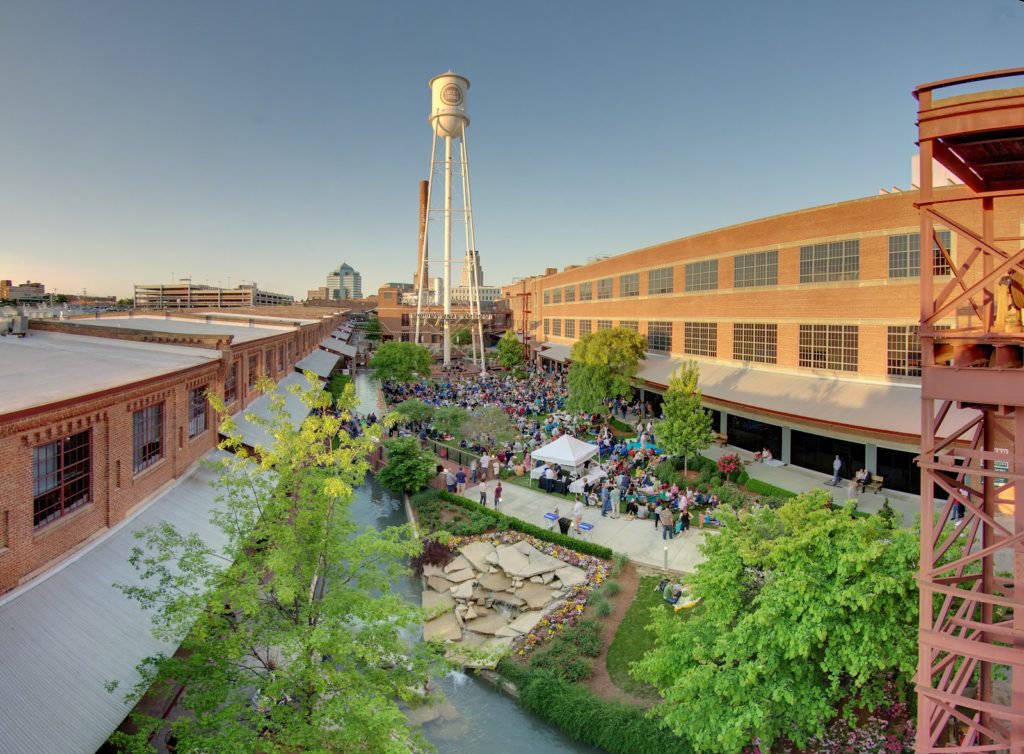
With the renovation and growth has come an influx of nationally recognized restaurants that emphasize slow cooking with local ingredients. Try the El Caney at the Old Havana Sandwich Shop, and stick around for Bull City Burgers, Mateo, Toast and Saltbox. The Federal, Cosmic Cantina and Dame’s Chicken & Waffles are downtown legends. (You get the point: Durham’s a foodie haven).
As real estate prices grow in the downtown area, coworking spaces are becoming the norm. If you’re looking to set up shop, there are a number of options from expansive American Underground, the welcoming Bull City Coworking, Mercury Studio for creative professionals, or newly arrived iNVICTUS.
American Underground @Main is the largest of these, with a coworking space on their basement level, multiple floors full of private offices for use by up to five people each, and an assortment of conference and call booths. They host events and local meetups, and they have a subscription-based incubator program in the American Tobacco Campus that offers mentorship and investment connections.
Bull City Coworking is a bit more open, set up in a renovated old school car dealership with huge windows. They don’t provide closed-door offices—why wouldn’t you want to be in all that natural light, anyway?—but they have a good mix of reserved and public space with lots of open meeting rooms and call booths.
Mercury caters to creative spirits. It’s difficult to claim lack of inspiration when the walls inside are covered in local art. You’ll also find a little spot saved for a neat shop called the Makery that handpicks NC-made goods along. Mercury also has space for a few artists with their own studios in the back of the space.
Just launched in June, iNVICTUS is the newcomer. With a coworking space that includes private offices, meeting rooms, and call booths, iNVICTUS aims to host and organize businesses and community events as the city grows. Free info sessions for families looking for housing? They want to host it. Do your kids need to print their college applications? They want them to come iNVICTUS. The group of business leaders who founded it aren’t just saying they want to be inclusive; they’re actually doing it by emphasizing the empowerment of artists, consultants and entrepreneurs already there in the local community.
Also launched in June, nido Durham knows startups aren’t limited to childless post-grads. They give parents space to work with the comfort of knowing your kid(s) are in the same building being supervised, and taught, by a Montessori teacher with experience. A Startup of its own, nido offers events that are both educational and social. As part of membership parents volunteer by supervising the kids and organizing community events. nido Durham is creating a community space for parents in the Triangle that’s truly unique and sure to appeal to parents on the entrepreneur’s journey.
These coworking offices regularly provide space for locals, Raleigh residents and RTP commuters alike to mingle through Meetup events for entrepreneurs. Durham is a popular hub for Girl Develop It RDU (1,392 members), NC Triangle Android (940), Agile [dev] Lunches (382), Triangle Hacker Hours (302), Triangle UXPA Book Group (214), and The Iron Yard (101), all of which offer the likes of free programming education and startup advice. There’s also a host of free events coming out of American Underground. Checking their twitter feed is one way to find out, but the best way is still word of mouth.
Meanwhile, ExitEvent is for confirmed entrepreneurs (that’s right, they check out your website before they let you in) who get together to socialize and talk business. They are a self-proclaimed “anti-networking” event that hands out free drinks and says “no” to selling. Check out their website; it does a stellar job of keeping up with startup news.
Challenges
When new money streams into an area where communities established themselves long before old tobacco warehouses started filling with server racks and coworking spaces, challenges arise. Local government officeholders provide incentives for new companies to roll in and construction to start on complexes to house their employees. Parts of the city are sold off as commodities with little consideration for folks who have been living there for generations. Realty prices spike. Existing businesses like Blue Coffee Cafe have to move when their buildings are “revitalized” into hotels. And places like American Tobacco Campus, which brands itself as hosting public space in the form of a sprawling lawn where families can attend concerts, aren’t actually public (as in, you won’t see any demonstrations being held there, despite Durham being home to brilliant activists).
But there’s a precedence for sustainable entrepreneurship that works in the community.
That precedence is Black Wall Street — a triumph against the odds in a Jim Crow South, and a chapter conspicuously missing from many history textbooks. In a city like Durham, honoring those business leaders of the early 1900s should be a given. Instead, I get the feeling many present startup success stories are (white) washing over it. The people behind Black Wall Street showed a strong entrepreneurial resilience, and banks invested in community businesses to bring success without dividing a city. Black folks have been holding it down in Durham long before white tech investors came along.
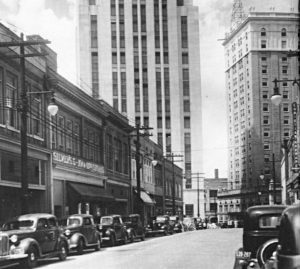
The Carolina Theatre was actually the site of protests against segregation in 1962, with Black and white activists requesting tickets at the front entrance rather than the side. Did Steve Case know about this piece of history? I don’t know; he didn’t mention it.
Conclusion
The first thing those coming in from outside Durham can do is pay attention. This is a city–with people–not an empty playground. History continues to speak, and startups are causing strife (the community’s as well as their own) with their inattention.
Durham has its rhythms; put your ear to the ground, and you’ll hear American Underground is pushing for 50 percent of its startups members to be women by the end of 2016. And business growth, which has largely been in the central downtown area, is moving south, according to iNVICTUS founder, Joe Biggs.
But business as usual isn’t going to cut it. Since the recession and with the shifts in technology, Durham millenials and entrepreneurs don’t want to work in office cubicles. We may live in separate neighborhoods, says Biggs, but we’re all human beings. One of his aims is to provide a community table at iNVICTUS where all sorts of Durham businesses can set up and leave their materials to share and lift each other up. “We’re changing the way you work because the way you work has changed.”
About the author
Patrick Sheegog is a North Carolina native who has a passion for technology and how people interact it. He works in a Durham based web startup called PennyPipe that automates reconciliation between payment gateways and cloud accounting software for CPAs and business owners.
Durham currently does not have an active StartupBlink community leader. We would love for you to join us as one.
